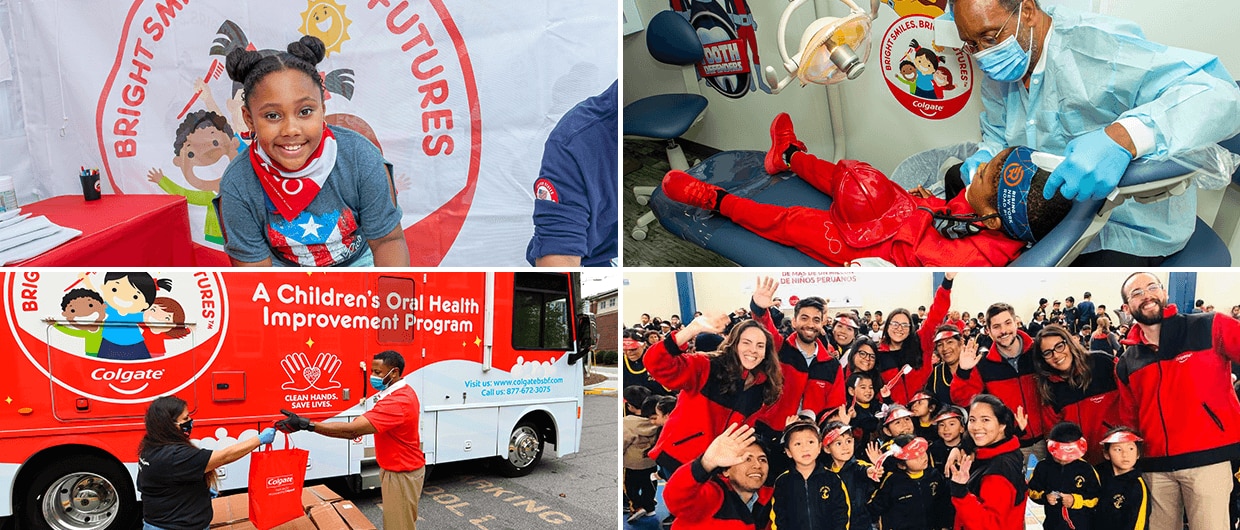Tooth pain leads to worry, anxiety and sadness in kids and parents.
Children in the U.S. miss up to three days of school a year with the CDC reporting that in total an estimated 51 million school hours per year are lost because of dental-related illness.
Parents in the U.S. lose up to three days of work due to their children’s oral health issues with the CDC reporting that employed U.S. adults lose more than 164 million hours of work each year as a result of oral health problems or dental visits.
Colgate’s research links oral health to overall wellbeing, underscoring the urgent need to address the prevalence of cavities as a public health crisis.
Global research from Colgate-Palmolive Company, the worldwide leader in oral care, reveals the effect of childhood cavities on children and parents’ quality of life and wellbeing, offering a compelling reason to prioritize oral health education during National Dental Hygiene Month and beyond.
Colgate conducted a survey of more than 20,000 parents across 12 countries to uncover the real-world impact of tooth decay. Among the 1,800 parents surveyed in the U.S., Colgate found 62% of children suffer from cavities—and these cavities are the source of significant physical, emotional, social, and economic consequences. The study draws another link between oral health and overall wellbeing and supports Colgate’s purpose to reimagine a healthier future for all.
Impact of cavities on emotional wellbeing
According to the U.S. parents surveyed, Colgate finds children experiencing oral health issues feel embarrassed (30%), worried (30%), sad (28%), and anxious (24%). Children with cavities also feel they cannot smile freely (27%) and are not able to concentrate (20%).
The toll of childhood cavities extends to parents too, with U.S. parents experiencing worry (50%), sadness (36%), and anxiety (25%) as a result of their kids’ pain and emotional distress. What’s more, 42% of parents whose children are experiencing oral health issues feel they have failed their child by not preventing their oral health issues, causing this subset of parents to feel ashamed (67%) and embarrassed (64%).
Impact of cavities on childhood development, adults’ livelihood, and the strength of our communities
The consequences of cavities in early life go beyond physical pain or emotional issues, with children missing valuable opportunities to learn, play, and grow and adults taking time off work.
Colgate’s study reveals how oral health issues hinder a child’s education and social development. Of the children experiencing cavities in the U.S., nearly half miss up to three days of school, whether due to pain or for dental treatments. Between a third and a quarter of children with cavities in the U.S. either need to miss social events and athletic activities due to pain or embarrassment or are just not interested in participating. The parents surveyed report their children avoid these extracurricular activities when they have cavities due to mixed feelings of confusion, powerlessness, and anger; as a result, they often miss milestones essential for their development, such as birthday parties, playing with friends, sports games, and family occasions.
The data points to ramifications for adults too. Colgate finds that more than half of parents in the U.S. take time off from their jobs to deal with their children’s cavities, sacrificing up to three days of work. When taken in sum, these lost hours have a significant impact on the economy: according to the CDC, over $45 billion is lost in productivity in the U.S. each year because of untreated oral disease.
Oral health linked to overall wellbeing
Colgate’s study builds upon a strong foundation of research that connects oral health and overall health. Colgate’s public health survey points to the toll of childhood cavities on mental health for children and parents alike, as well as the impact on social and economic development. For adults, oral health has also been linked in other studies to physical health conditions such as cardiovascular and respiratory diseases, diabetes, adverse pregnancy outcomes, pneumonia, Alzheimer’s, rheumatoid arthritis—even oral cancer.
“Overall health, emotional health and community health can all depend on oral health,” said Colgate’s Chief Clinical Officer, Dr. Maria Ryan. “Colgate-Palmolive’s global study underscores the fact that oral health is a key factor to unlocking a brighter, healthier future for kids, their parents, and our communities. During National Dental Hygiene Month, and all year long, Colgate is on a mission to help people through all stages of life to understand the connections between oral and overall health, because if we do that, we move one step closer to reimagining a healthier future for all.”
Colgate-Palmolive and oral health
With the Colgate brand in more homes than any other, Colgate-Palmolive is uniquely positioned to address the global crisis of oral disease, which affects nearly half of the world’s population. Colgate is spreading the important message that a healthy future begins with good oral health, while taking steps to increase access to oral health education and remove barriers to oral care worldwide.
“Despite being largely preventable with simple, cost-effective tools such as the toothbrush and fluoride toothpaste along with a healthy diet, cavities remain the most common chronic disease among children globally. It doesn’t have to be this way. Oral health has long been overlooked, and now is the time to take action. A healthy mouth is a foundational building block for our own wellbeing and the strength of our communities, and that’s why Colgate is committed to promoting oral health access and education across the globe,” said Ryan.
Outreach
For more than 30 years, the Colgate Bright Smiles, Bright Futures program has been providing oral hygiene education and resources for underserved families worldwide, so that children can build proper oral care habits early on and safeguard their healthy futures. Through Bright Smiles, Bright Futures, Colgate has reached more than 1.3 billion children in over 80 countries, with the goal to reach 2 billion kids by 2025.
Innovation and Education
Colgate is an industry leader in oral care research, recently launching a groundbreaking study with Verily to advance the understanding of the connection between oral health and overall health. To empower people to improve their brushing habits, Colgate develops innovative connected health products like hum by Colgate, which also includes a smart battery-powered version for older kids and a manual toothbrush with augmented reality for younger kids to help them develop healthy habits at a young age.
Colgate supports multiple scholarship and fellowship programs to increase diversity within the dental profession and empower the next generation of dental professionals. Colgate recently launched the “Audacity to Dream” scholarship program with the National Dental Association Foundation and partnered with the Harvard School of Dental Medicine to create an endowed scholarship for underrepresented minority students.
Engagement
Colgate employees dedicate hours of community service in pursuit of better oral health outcomes around the world through Colgate Cares Days and the Colgate Bright Smiles, Bright Futures program. In addition, Colgate collaborates with retail partners and community organizations globally to promote oral hygiene and preventative oral care.
For more information on the link between oral health and overall health, visit Colgate.com. Follow Colgate-Palmolive on LinkedIn to stay up-to-date on how Colgate is reimagining a healthier future for all people, their pets and our planet.




